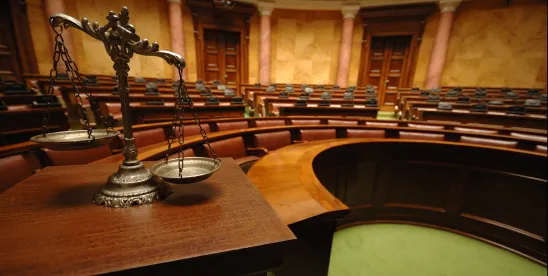In a commercial dispute involving allegations against a manufacturing plant, plaintiff’s counsel was cross-examining a plant manager:
Q: “So, you thought the equipment at your plant was garbage?”
A: “I wouldn’t put it that way.”
The courtroom fell silent, and the questioning attorney’s excitement was palpable. This was his “gotcha” moment. He instructed his courtroom technician to pull up Exhibit 503. Larger than life, the screen displayed text from an email dated June 2, written in the plant manager’s own words: “The equipment at this plant is garbage, and I want to throw it away like garbage.”
Plaintiff’s counsel proceeded to tie the bow on his point:
Q: “Well, you did on June 2, didn’t you?”
In terms of courtroom drama, it was a big moment. The witness backtracked in a panic, resorting to awkward denial. The defense attorney then felt obligated to rehash the issue in closing arguments—in a well-meaning attempt to support his flailing witness, he echoed the witness’s insistence that he had actually meant something different than what he wrote.
Now, of crucial note here, this email was not a critical part of the case. It was not used as evidence to support any particular finding on any specific verdict form question. None of the claims involved equipment functionality. And yet, when we later spoke with the trial jurors through post-trial interviews, we learned just how impactful this issue had become for them.
Why Credibility Matters
The jurors shared with us an influential dynamic that took place early in deliberations. The panel had begun by going around one by one to share their initial impressions. The juror at the head of the table went first and gave his overall view of the case. The next juror in line was no more than 30 seconds into her perspective when juror #10 interjected:
“I'm sorry to interrupt, but when that witness tried to tell us that the plain language in their email didn’t mean what it clearly said, I just lost it. I didn’t believe a thing that witness said for the rest of the trial.”
He was not the only juror to feel that way—just the first to speak up. The common thread in our interviews was that this email, initially a minor and insubstantial piece of evidence, had become central to the case. It formed a decision point for the jurors upon which the defense’s credibility was eviscerated. None of the other testimony from this witness or messages from the defense mattered, because the jurors did not trust them anymore.
This example offers a small reminder that credibility is a variable in communication that cannot be overlooked.
What Went Wrong Here?
1) The Witness Gave in to Anxiety
Simply put, the witness was embarrassed by the email he wrote. He had written it late at night after a few drinks, and now he was worried that his folly would cost his company the whole case. Faced with that pressure on the stand, he retreated from it through denial, believing that if he said the email meant something else, the problem might disappear.
2) Counsel Followed the Witness off the Cliff
Faced with the bad email and the fumbling testimony of his witness, the attorney was left holding the hot potato. He felt that the best way to manage it was to get behind the witness and support his denial. Not only did this put the issue back in the spotlight without actually helping the witness, but it dragged defense counsel’s credibility right down with him. To jurors, the entire defense was now instructing the jury not to believe their own eyes—what else might it be trying to mislead them about?
3) The Defense Sacrificed Credibility for “Logic”
From a broader standpoint, this episode reflects a defense mistake that is all too common: sacrificing credibility by denying a witness’s humanity. To understand this tendency, we must briefly touch on communication theory as it applies to civil litigation:
- Aristotle defined the three key rhetorical elements as “logos,” “pathos,” and “ethos.” While there are many slight variations in translation, the practical meanings are “logic,” “emotion,” and “credibility.” Each informs the others, with optimal communication arriving through successful appeals to all.
- Because of the nature of legal education and training, defense attorneys rarely neglect logos. After all, attorneys are extensively trained to use facts and law to construct a logical argument in case filings and motions. Historically, defense verdicts were achieved by using logic, picking apart the evidence to show that plaintiffs have not met their burden.
- Pathos, on the other hand, tends to be seen as the playground of plaintiffs. Plaintiff attorneys are bringing claims of damage, harm, and/or injury. They are the side formally casting blame. Emotional appeals go hand in hand with such claims. Meanwhile, emotion seems at first glance to be incompatible with the nature of defense. The plight of the defense attorney is frequently to ask jurors to put emotion aside and focus on the evidence and facts of the case.
- However, defendants must keep in mind that the historical way of trying cases—focusing solely on logos and breaking down plaintiffs’ burden—does not work as it may have in the past. And while we believe there are a number of ways the defense might reclaim pathos, one solution is to use the third element, ethos, to open the doors for other types of appeals in turn.
When it comes to witnesses such as the plant manager discussed above, the defense response failed because the witness and his attorney clung to a stiff, “logical” framing—i.e., “you are all misinterpreting what was written”—of an email he had clearly drafted emotionally. The disconnect was so obvious to jurors that this decision sunk the defense’s credibility over an otherwise minor, irrelevant issue.
Faced with circumstances like these, we recommend building that credibility (or at least not destroying it) by acknowledging and embracing the witness’s humanity.
How Do We Get Better?
A common barrier to analyzing credibility is that the analysis does not come from a representative audience. It is coming from you, your colleagues, or other friendly supporters of your cause. When looking at troubling evidence from the inside circle of advocacy, it can be difficult to keep an accurate perspective. Some call this “drinking your own bathwater.” The defense response to the plant manager’s email was a victim of this dynamic—people all wanted to believe the same thing, to the point that they ignored the obvious.
Solution 1: Test Before You Present
Particularly in substantial cases, it is critical to get the opinion of people representative of your likely audience as soon as possible. An early assessment helps guide discovery by providing information about what community members think and what is important to them in evaluating the case. It shapes the way you prepare witnesses, ask questions in depositions, and select experts that will be compelling and credible to a jury. It also provides insight into your best logical and emotional arguments.
Solution 2: Strategic Witness Preparation
You might think your own friendly plant manager will be liked by all, only to be shocked when he bristles at cross-examination or cannot stop talking. Simulating actual leading questions in a preparation setting and putting embarrassing emails in front of witnesses prior to depositions helps you flag such issues early.
Depending on the situation, the case, and the witness, the preparation process can be more about tactics (e.g., how to handle a loaded question), getting the witness in the right place emotionally (e.g., “I have to own this email”), or just getting them practiced in the cadence of communicating in this unfamiliar context.
Strategic preparation allows counsel and the witness to get ahead of the messaging around a bad piece of evidence. In our example, it would uncover the plant manager’s impulse to retreat and deny, and then encourage him to own his message and show his humanity to the jury. It takes time and energy, of course, and the witness must have support from the trial team to reach that mental state.
Over the years, we have found a helpful question to ask the witness is, "What was going on when this happened [with you, with your company, etc.]?" After letting the witness talk it out and vent a little, they are more comfortable articulating what they truly feel, which is inherently more credible.
Revisiting Our Example
With all of this in mind, a better exchange for the plant manager would have involved his owning the email and allowing the jury to see him in a relatable moment of frustration:
Q: “So, by June 2, you had concluded that the equipment was garbage.”
A: “On June 2, I told my team the equipment was garbage—I was popping off and trying to light a fire under them.”
Q: “This email clearly says ‘garbage.’”
A: “I wrote this email on a day that was far from my best. I was frustrated at the slow progress of our project, and I popped off to the group in a way that seemed helpful at the time, but the next day, it was clearly just a selfish venting episode on my part.”
Q: “So you’re saying this is hyperbole?”
A: “I’m saying it was a momentary lapse on my part, and I vented my frustration. I apologized to every team member the next day in person or by phone.”
Q: “Is this something you have to do often?”
A: “Not often, but sometimes I make mistakes.”
In research exercises with a question-and-answer exchange like the one above, we have found that when a witness owns their behavior and the feelings behind it, their credibility skyrockets. Jurors can relate to being frustrated and saying things they later regret.
Note that the witness is not “defending himself” as much as he is trying to state as accurately as possible how he views this situation. Furthermore, his take demonstrates self-awareness while putting forth a rationale his audience can relate to.
In Conclusion
In a traditional, logic-first defense mindset, exhibiting humanity feels uncomfortable or even downright vulnerable. However, it can allow the defense to better embrace the “bad stuff” and be accepted by the jury as a credible source of information—one they are far more willing to trust as they hear future arguments. Preparing your witnesses to acknowledge difficult facts and respond with confidence is a critical part of the process.





 />i
/>i
